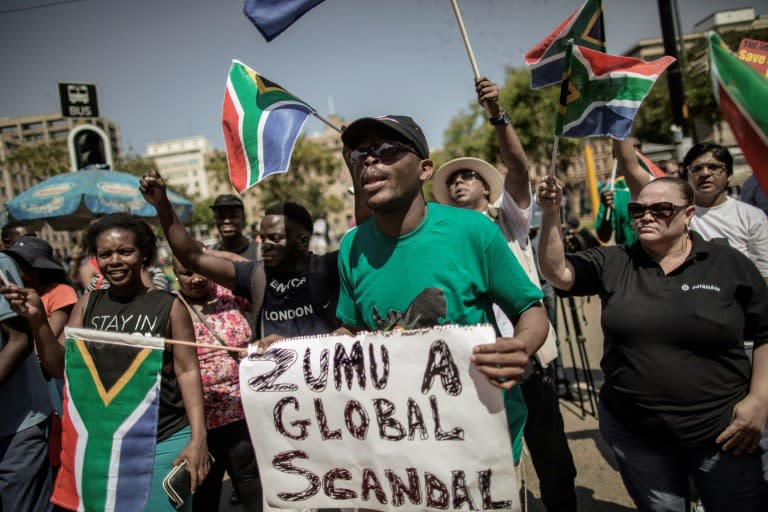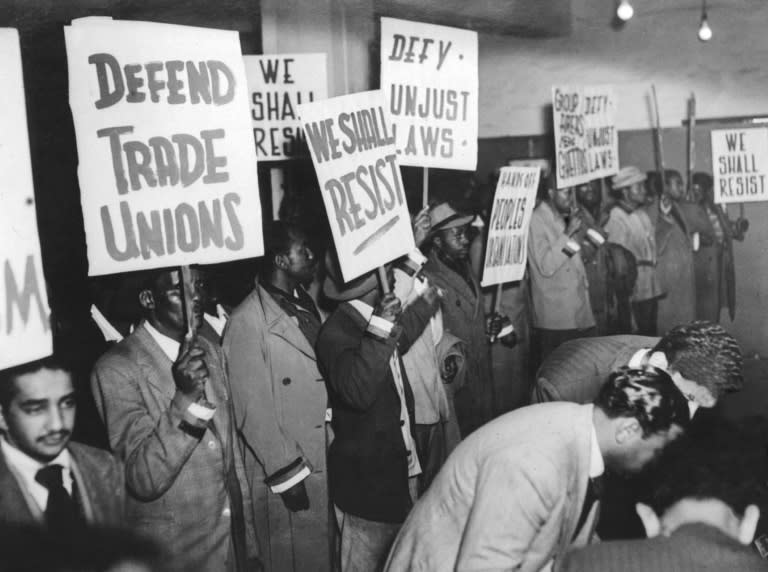ANC: From anti-apartheid fight to internal struggles
South Africa's ruling African National Congress (ANC), now struggling with internal conflicts, started out as an elite black group. The liberation movement took power in 1994, four years after the lifting of a four-decade ban linked to its fight against the white minority rule of apartheid. - Early days - - 1912: On January 8, influential blacks found the South African Native National Congress (SANNC), two years after Britain and the descendants of Dutch settlers form the Union of South Africa in which only the rights of whites are protected. In 1923, the SANNC changes its name to the African National Congress (ANC) but remains fairly inactive. Oliver Tambo, Nelson Mandela and Walter Sisulu start the ANC Youth League (ANCYL) in 1943. Mandela later writes they felt the old leadership was "a tired, unmilitant, privileged African elite more concerned with protecting their own rights than those of the masses." - Apartheid - In 1948, the National Party wins elections and introduces apartheid. The ANCYL advocates strikes, boycotts and civil disobedience. The ANC organises its first large "Defiance Campaign" in 1952, and tens of thousands of blacks break curfews, burn internal passports, and enter whites-only areas, risking jail. - Outlawed - On March 21, 1960, police kill 69 people during the Sharpeville Massacre. The ANC and an offshoot are banned amid a state of emergency. The ANC goes underground in 1961 and abandons non-violent protest. Mandela starts the military wing Umkhonto we Sizwe (MK) and launches attacks. In 1962-63, Mandela, Sisulu and other ANC leaders are arrested and sentenced to life imprisonment. The movement continues the struggle in exile from London, Dar es Salaam and Lusaka and allies itself with the Soviet bloc. - Secret talks - In the late 1980s, officials declare states of emergency to curb violent riots in black townships, but the government also begins secret talks with the ANC. In 1990, new South African president FW de Klerk legalises the ANC and other groups. He also frees political prisoners, including Mandela, who becomes the ANC president the next year. Negotiations for the transition to democracy start and parliament scraps the remaining apartheid laws. - Multi-racial elections - On April 27, 1994, the ANC wins 62.6 percent of the vote in the first multi-racial elections. Mandela becomes South Africa's first black president. Thabo Mbeki succeeds Mandela as president in 1999 but his two terms are tarnished by allegations of abuse of power and denialist policies over AIDS. Mbeki is recalled by the ANC in September 2008 before the end of his second term. Jacob Zuma, cleared of previous corruption and rape charges, becomes president in 2009 after the ANC wins 65.9 percent of the vote in the fourth general elections since the demise of apartheid. - Fall from grace - The ANC suffers a setback during municipal elections in 2014, taking less than 54 percent of the vote and losing an absolute majority in five of the six biggest metropolitan areas. Zuma is dogged by corruption scandals and says in January 2017 that a woman should take over as head of the ANC. That is implicit backing for his ex-wife, Nkosazana Dlamini-Zuma. On March 31, Zuma sacks finance minister Pravin Gordhan in a cabinet purge and stirs animosity among senior ANC leaders.



